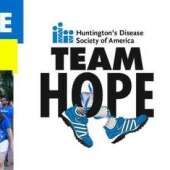Thankful People: Thankful for new liver, pink feet; and that a death saved her life
Wednesday, November 21, 2018 ~ Updated 6:25 PM

Today, the day before Thanksgiving, holds special significance for Pam Pensel, a teacher at Cape Girardeau Central High School who, on a day very like this one three years ago, was released from the hospital following a liver transplant that saved her life.
Three years ago in February, her coworkers noticed the whites of her eyes were yellow, she said. But it wasn't all the time.
So she made an appointment with a doctor, and discovered that her bilirubin level was 9.
A score of 0.3 to 3 is normal, she said.
"You know it's never good news when the doctor calls," she said.
The phone rang, and she was immediately nauseated, she said.
Her husband, Rodney, answered the phone, and was told she'd have a 2 p.m. appointment with a gastroenterologist, then a 3:30 p.m. CAT scan.
"Holy crap, this must be really bad," she remembers thinking.
But, she said, the timing was more about the doctor having a cancellation.
"That made my heart stop pounding," she said.
At that point, she still thought it might not be terribly serious. She'd had her gallbladder removed a couple of decades prior, so she thought it could be a gallstone blocking her bile duct.
The doctor called back, and results showed no stone, and no tumor.
"That was the good news," she said.
But the doctor wanted to do a liver biopsy, and, she said, "That's a terrible word. That means they're looking for cancer, usually."
And a liver biopsy is complicated, she said, since there are a lot of blood vessels and inner workings. There's an elevated risk of bleeding or internal damage, especially since the liver aids in blood clotting -- so there was that added level of anxiety.
Ultimately, she was diagnosed with primary biliary cirrhosis, now called cholangitis, a chronic, incurable autoimmune disorder that attacks the liver, eventually destroying the bile ducts.
It's a slow-progressing condition, Pensel said, and usually affects women.
She'd lost some weight over the previous few years, and didn't think much of it, but that was likely caused by her condition, she said.
And she'd had fatigue, and her skin was turning yellow to orange.
She teaches at Central High School, and this is her 11th year, Pensel said. This year's seniors were freshmen the year she was sick, she said, and one student remembered Pensel had been "kind of pumpkin colored" then.
"It was funny," Pensel said, but underscored just how serious her condition was.
It had crept up on her, she said, and could have been a worsening condition for as long as 20 years. She just doesn't know.
It was a bad situation, she said, and the treatment is a transplant.
"I said, 'OK, I've known people who have had transplants,'" she said.
But she had fears, she said. Cost, the daunting unknown of it all, and how it would affect her family and her work were chief among her concerns.
So she and Rodney got to work. She researched the condition, found other patients' narratives of their experiences, and talked with their daughters.
And, she said, the hospital provided a liver transplant class.
She was in the classroom with several other students, all of whom were suffering from something, but they didn't really go into details with each other, she said.
"We were there for all kinds of reasons," she said, simply.
And there was a social worker to help with financial planning, she said.
"I needed a lot of tests," she said, and that's what she spent the summer of 2015 doing -- a chemical stress test, an MRI, a pulmonary test and others.
She didn't spend long on the list, she said, and while she wasn't told exactly why, she suspects her blood type had something to do with it. She's AB+.
"There's a lot you don't know," she said of her treatment.
The tests were in August, she said, and for the next month or so, every time the phone rang, she leaped for it, thinking it might be The Call.
But after awhile, she forgot, she said.
What really stands out in her memory about this time was the fatigue, she said. And the itching. She itched all over, since her liver wasn't filtering her blood correctly, and her blood clotting wasn't great either.
"It was all I could do to just get through the day," she said.
But she had her bag packed and ready to go once the call came, she said.
She'd have a limited amount of time to get into the car with her husband and arrive at the transplant center in St. Louis, she said.
So she made ready.
And she waited.
And waited.
And finally, late one night, when everyone was out of the house except for her -- of course, she said -- the phone rang.
It was the hospital.
"We have a liver," said the voice on the other end.
But, she said, she didn't get her hopes up.
"Until you have the incision, it's not a sure thing," she said.
After a few days of testing, waiting, preparing, the surgery went ahead.
"I just think about how ill I could have been and wasn't. I thank God. I'm convinced the peace I felt was His hand on me."
People from the East Coast to West Coast, Butler, Scott and New Madrid counties, Cape Girardeau and more, were praying for her, Pensel said.
"I felt all of those, and I think my family did, too," she said.
But, she added, "I had the easy part."
The surgery was from 6 to 11 a.m., and all she had to do was follow doctors' orders and be put under anesthesia.
"I didn't think 'What could go wrong?' I was oblivious," she said.
She did have the conversation, though, she said. The just-in-case conversation. The "what I want the girls to know" conversation.
"I can't describe the peace," she said. "I knew it was going to be OK."
But the fact doctors could take an organ from one person and give it to somebody else, it's mind-boggling, Pensel said.
The process wasn't like television portrayals, she said, with a cooler and ice, helicopters and high drama. In her case, the donor was at the center where the surgery was performed, and recipients were brought there for procedures.
And, she said, her first memory on waking is of Rodney, at the foot of her bed in the intensive-care unit, and her question to him: "Did they do it?"
Yes, he'd said, and her feet were already turning pink.
"I asked for a mirror," she said, and there they were, as promised, her feet, turning pink again.
The doctor came in and told her the incision took 60 staples and looked something like the Mercedes symbol.
Recovery was tough, she said, and there were some unexpected turns.
"The first time I ate food, it all tasted sweet. It was the strangest thing," she said. "Candy? No thank you."
Texture was another issue, she said. If the first bite wasn't right, the rest wasn't getting eaten.
But, she said, "I think God was giving me patience lessons," Pensel said. "I had to earn it."
The timing of it was "the way God does things," she said.
But one setback nearly undid her, she said. Test results after the surgery indicated she was having kidney problems, possibly severe enough to require a transplant.
"I fell apart," she said.
But her daughters said it was a smaller incision for a kidney transplant, and she was already on antirejection medication, she was under excellent medical care -- so it wouldn't have been a major disaster, Pensel said.
"I was thinking the other day about family support, and where would I be without it," Pensel said. "My mom and dad, my husband. God."
Her husband was with her at the hospital nearly every night, she said, and so many friends came to visit or check up on her; people prayed.
"I don't think I'd be here without them. They kept me going," she said. "Sometimes I needed a cattle prod."
But when she was released from the hospital, it was into a hotel room, the day before Thanksgiving.
They had dinner that day in 2015 in the hotel, she said. Family members brought dishes to celebrate not just the holiday, but Pam's successful surgery.
"My sister-in-law said, 'This is the best Thanksgiving. You're pink again,'" Pensel remembered. "It doesn't sound like that big a deal, but it was. In the moment, it was."
On reflection, Pensel said, there's a lot here.
"To think, someone had to die so I can live," she said. "We rejoice, another family mourns."
But, she said, her mother was told that family was already going to be mourning -- this way, their loved one can live on.
"I don't want to take that for granted," Pensel said.

































